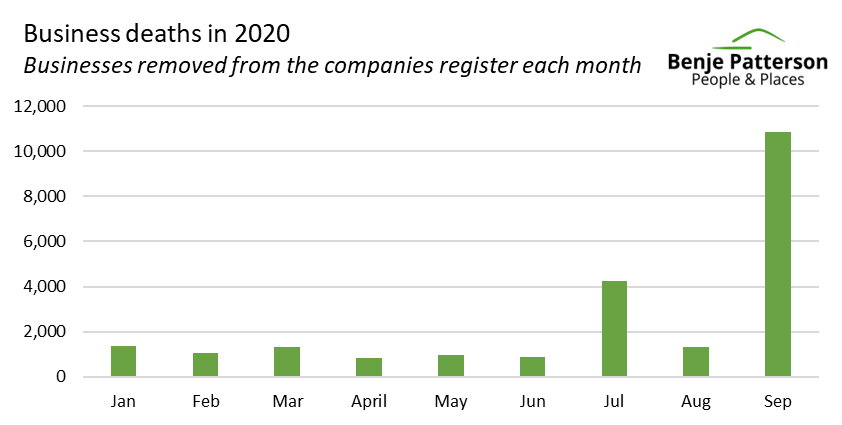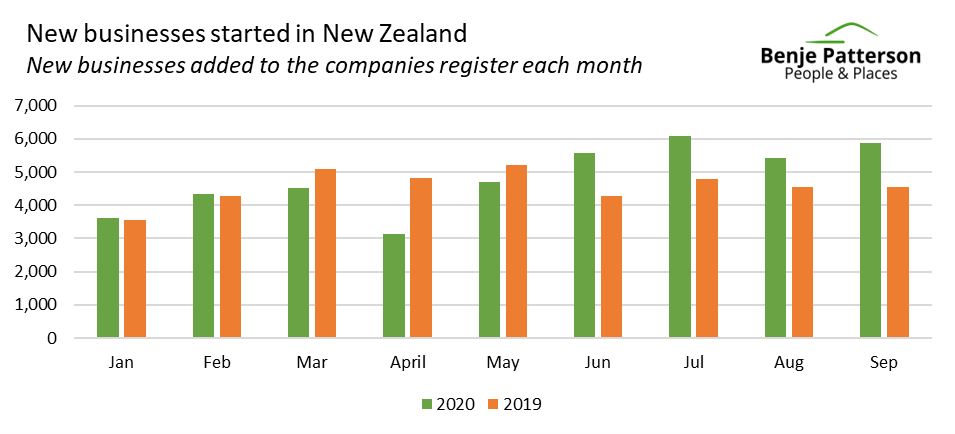
By Benje Patterson*
Entrepreneurship during crises is a topic that has long fascinated me and is something I have followed closely during the COVID-19 pandemic. Previous crises have shown that entrepreneurial spirit to give something new a go persists throughout the crisis, while there is a lagged response for business deaths, as existing business owners survive as long as they can. This article analyses data from the Companies Register to understand what has happened over the months since the COVID-19 pandemic hit.
10,827 closures in September
Dealing with the bad first. There were 10,827 businesses removed from the Companies Register in September, well up on the lockdown low of 839 in April. The September closures were equivalent to 1.9% of the business stock, while the April figure was equivalent to 0.1% of businesses.
The low level of business deaths in April and May did not reflect the true extent of challenges in the business environment. There is often a lag of several months between when a business experiences hardship and when the decision to shut down is taken and actioned by the businesses’ accountant.
As had been anticipated, business deaths have more recently begun to creep higher, because some aspects of the government’s extraordinary support measures have drawn to an end and business owners have made reasoned decisions about their future given a more challenging economic environment.

Understandably there was an overrepresentation of closures of hospitality, support services, retail, and media businesses relative to their overall share of businesses.
But startup spirit remains
Nevertheless, don’t get too concerned just yet. Offsetting these closures have been surprising levels of business startups, which rose sharply in the September quarter. The structural changes occurring in the economy have created opportunities for some new business ventures, while other businesses have been created by people who lost their jobs, or just had more time to pursue an idea.
New business starts totalled 17,358 across the September quarter, compared to 13,903 in the same period during 2019. Even during the June quarter, which included the Level 3 and 4 lockdown period, there were 13,424 businesses started.

The businesses started over the past six months have been the equivalent of a 5.3% addition to the business stock.
There was an overrepresentation of a range of professional, financial, information media, administrative and real estate services relative to their shares of the existing business stock. Churn in the retail sector was also evident with high rates of retail startups to replace those falling by the wayside during the pandemic.
The road ahead
Over the months ahead, the composition of industries and places in which businesses start may change. As we move towards a new normal, opportunities will emerge unevenly across industries. Not only is the crisis affecting patterns of customer demand, but business practices and supply chains will look different to before the crisis.
This process of change is a friend of entrepreneurship, with new gaps that emerge driving potential business ideas.
However, change will also leave some existing businesses in a position they are unable to adapt from. As a result, there will still be a large number of business deaths that emerge during the rest of the year.
The lessons from the Global Financial Crisis (GFC) showed that there is a lagged response for business deaths, as business owners survive as long as they can. But the GFC also showed that entrepreneurial spirit to give something new a go persisted throughout, with business startup rates remaining surprisingly high at all stages of the crisis. When faced with reduced other prospects, the opportunity cost of failure for budding entrepreneurs is less. This flexibility to adapt is something that can help drive New Zealand’s economic recovery.
Benje Patterson is an economist, and strategist. "He is passionate about New Zealand’s regions". This article is a repost from here. It is reproduced with permission.
10 Comments
Many who lost jobs and opting for contract business or service, also have to register a company.
Will be interesting to know, how many have registered as builders/ construction as this seems to have become a new cottage industry of NZ with everyone trying to enter and become a builder.
Do we have data to reflect, how many have registered as builder / home construction.
Also, how many have decided to join the RE marketing, sales and perhaps mortgage brooking? - This is a nationwide obsession, after all govt & RBNZ policies are all about ring fencing those policies around this economy of Finance Insurance Real Estate. An ex. airliner industry staffing recently put more focus becoming an RE agent, bring a planned precision focus customer targeting vision and surely, so should be more to come from Hospitality, tourism & travel industries - we love their warmth, perfect mannerism. There could not be a better time for NZ RE poster.
Agree any business in NZ should be around housing and no one is asking question to Jacinda as will be interesting to see how she responds just like National politicans.
stuart, you don't have to register a company if you opt for a contract business or service: you can trade as a sole trader or as a partnership. From my life-time experience in business it is simply easier to trade as a sole trader: less paperwork, hassle and cost. You could concurrently register a company to help protect your trading name if you thought it worth protecting. And anybody lending you finance (eg a bank) would require a personal guarantee anyway. In fact, I would be more reluctant to give credit to a company I hadn't heard of, than to a sole trader whose address I new or could track down.
The annoying thing about company registration is that someone can use your address as the registered address of a company and you can do nothing about it. My brother used my address to register a company without my permission and for a number of years his creditors would now and again come to my address expecting to find him there. I didn't have a clue where he lived. He was effectively a conman who specialized in ripping off new finance companies.
Thanks Benje for this article, I find it very interesting and useful, rather than just blindly assuming lockdowns have killed businesses and all is bad in NZ.
I'd make 3 comments,
1) The spike of business closures in September is huge and we can only hope at this stage that it doesn't represent a growing trend, time will tell.
2) The number of new businesses is impressive but new businesses generally don't employ people, it takes time for the new business to grow and for the owner to be confidents the growth will be sustained so he/she can pay the new staff.
3) Stuart above makes an interesting comment about laid off people starting as contractors so having to register as a new business, does this represent a significant number?
On balance of the above, I think we are clearly losing employees, which is obviously not good.
I would love to get a month update on these numbers from you, how about it?
Business deaths in September skyrocket.
Business creation in Jun/Jul/Aug up on last year.
The cynic in me wonders how many were "started" just to get a subsidy.
That's exactly what I was wondering. Has there been a way to borrow/receive money for your business which won't have to be paid back if you close? And then potentially additional funds to opening a new businesses? Who would look at this?
Surprising level of startups! Nah.
In preparation for more Covid fraud and completely anticipated if you live in the real world.
.. also happening in the USA.
You just need to look at the state of Auckland's commercial lease market on Trade me to see what the changing environment is like. Pre covid commercial leases were around the 6000 - 7000 mark. Its now up over 13,500 and growing with the majority not able to find new tenants.
how many are people liquidating and starting a new company, age old practice in NZ to escape the debt
https://www.stuff.co.nz/business/123156765/justice-denied-how-unpaid-wo…

We welcome your comments below. If you are not already registered, please register to comment
Remember we welcome robust, respectful and insightful debate. We don't welcome abusive or defamatory comments and will de-register those repeatedly making such comments. Our current comment policy is here.